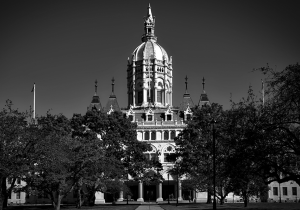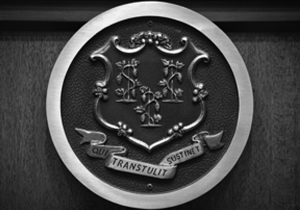What a difference an election year can make. After November’s election when, for the first time in nearly 40 years, Republicans gained enough seats to tie the Senate 18-18, and took eight seats in the House, creating a 79-72 four-vote swing margin, a new political dynamic took shape in the CT General Assembly. It’s a dynamic that has forced robust, but respectful debate in both chambers; stalled attempts to fill a two-year, $5 billion deficit and pass a balanced 2018-19 budget; caused greater scrutiny of proposals and more compromise, and yes, produced some good theater at times.
As a result, the number of bills that cleared both chambers this year was significantly diminished (about 200), despite the fact that there has been ample time — very few budget meetings have taken place between legislative leaders and the Governor’s office in the closing weeks of the session, which is highly unusual. Note: The Governor, who is not running for re-election when his term expires in 2018, has negotiated a union concession framework aimed at reaching a tentative agreement, which would save the state some $1.5 billion in the next two years. The tentative agreement is subject to approval by the rank-and-file. If and when union members approve the concessions, the agreement has to be approved by the Legislature.
Following is a sampling of proposals that were debated during the session — some of which made the cut, while others ended up on the cutting room floor:
Bills that Failed
- Legalization of Marijuana for Recreational Use
- Toll Study and Implementation
- Millstone Energy Sales
- Carbon Tax
- Prohibition on Fracking Waste
- Police Misconduct
- Tesla Direct Sales
- Campaign Finance Reform
- Pay Equity
- On-Call Shift Scheduling
- Paid Family Medical Leave
- Minimum Wage Increase
- Fixes for Crumbling Foundations
Bills that Passed
- Approval of Third Satellite Casino in East
- Windsor operated jointly by the Pequot and Mohegan Tribes and aimed at stemming competition from an MGM casino in Springfield
- Constitutional Lock Box for Transportation Funding
- Pilot Program for Autonomous Vehicles
- Bail Bond Reform
- Opioid Prevention and Treatment
- Regulations Governing Uber Drivers, Pricing and Insurance and Providing Regulatory Relief to Taxis
Finally, the Legislature passed a resolution to reconvene in Special Session, at a date to be determined, to take up a 2018-19 budget; a bond package; school construction; and budget implementation bills. Many of the bills that failed during the regular session, but which have revenue or spending or capital implications (e.g. tolls, crumbling foundations, and marijuana legalization) are items that could be considered in the upcoming budget negotiations.


